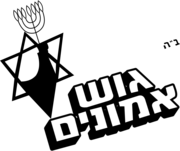Gush Emunim גּוּשׁ אֱמוּנִים | |
|---|---|
 | |
| Leader | Zvi Yehuda Kook (1974-1982) |
| Governing body | Hanan Porat Moshe Levinger Shlomo Aviner Menachem Froman Yoel Bin-Nun Yaakov Ariel |
| Founder | Zvi Yehuda Kook Haim Drukman |
| Founded | February 1974 |
| Succeeded by | Yesha Council |
| Armed body | Jewish Underground |
| Settlement body | Amana |
| Political party | National Religious Party |
| Ideology | Neo-Zionism Religious Zionism Jewish messianism Jewish fundamentalism Halachic state Settler interests |
| Religion | Orthodox Judaism |
| State of Israel |
|---|
 |
Gush Emunim (Hebrew: גּוּשׁ אֱמוּנִים, lit. "Bloc of the Faithful") is an Israeli ultranationalist[1] religious Zionist[2] Orthodox Jewish[3] right-wing fundamentalist activist[2][4] movement committed to establishing Jewish settlements in the West Bank, Gaza Strip, and Golan Heights.[5]
While not formally established as an organization until 1974 in the wake of the Yom Kippur War, Gush Emunim sprang out of the conquests of the Six-Day War in 1967, encouraging Jewish settlement of the land of Israel based on two points, one religious and one practical. The religious point was a belief that, according to the Torah, God wants the Jewish people to live in the land of Israel and had returned lands such as the biblical Judea and Samaria as an opportunity for the Jewish people to return to their ancestral homeland.[6][7] The second point stemmed from a concern that the pre-1967 borders, a mere 10 km (6.2 mi) wide at its narrowest point, were indefensible, especially in the long term, and it was therefore necessary to ensure that the land captured in the Six-Day War remained under Israeli control by creating a Jewish presence in the region and placing "facts on the ground".[8][7] While Gush Emunim no longer exists officially, vestiges of its influence remain in Israeli politics and society.[9][10]
- ^ "World: Two Standards of Justice". Time. 21 August 1978. Retrieved 5 June 2022.
High on a hilltop above the valleys of the West Bank, 35 families belonging to Israel's ultranationalist Gush Emunim are building a new settlement named Beth-El. They claim that 120 Jewish families are waiting to move into the settlement, nine miles north of Jerusalem, in territory that Israel has occupied since the 1967 war. There are plans for schools, a religious study center, an industrial area and even a holiday resort.
- ^ a b Aran, Gideon (1991). "Jewish Zionist Fundamentalism: The Bloc of the Faithful in Israel (Gush Emunim)". In Marty, Martin E.; Appleby, R. Scott (eds.). Fundamentalisms Observed. The Fundamentalism Project, 1. Chicago, Il; London: University of Chicago Press. pp. 265–344. ISBN 0-226-50878-1.
- ^ Ehud Sprinzak, "From Messianic Pioneering to Vigilante Terrorism: The Case of the Gush Emunim Underground", in David C. Rapoport (ed.), Inside Terrorist Organizations, Routledge 2013 pp. 194-215, p. 194.
- ^ Peri Kedem, Amos Bilu and Zila Cohen (Lizer) "Dogmatism, Ideology, and Right-Wing Radical Activity" In Political Psychology, Vol. 8, No. 1 (Mar. 1987), pp. 35-47 JSTOR 3790985
- ^ Fundamentalism, Terrorism, and Democracy: The Case of the Gush Emunim Underground by Ehud Sprinzak, Hebrew University of Jerusalem. Last accessed: 9 August 2009.
- ^ Analyses of Gush Emunim have been carried out by David Newman. See: D. Newman, 'Gush Emunim', Encyclopaedia Judaica Decennial Yearbook, 1994, pp. 171-172. Keter Publishers; D. Newman, `Gush Emunim: Between Fundamentalism and Pragmatism', Jerusalem Quarterly, 39, 33-43, 1986: D. Newman, 'From "hitnachalut" to "hitnatkut": The Impact of Gush Emunim and the Settlement Movement on Israeli Society', Israel Studies, Vol 10 (3, 2005: See also T. Hermann & D Newman, `Extra Parliamentarism in Israel: A Comparative Study of Peace Now and Gush Emunim', Middle Eastern Studies, 28 (3), 509-530, 1992.
- ^ a b "Yossi Klein Halevi, Like Dreamers, 2013", The New Jewish Canon, Academic Studies Press, pp. 221–226, 4 August 2020, doi:10.2307/j.ctv1zjg9h6.40, retrieved 25 February 2022
- ^ "Israel – Geography". U.S. Library of Congress.
- ^ "The Ideological Resonance of Zionist Fundamentalism in Israeli Society" (PDF). Archived from the original on 16 March 2012. Retrieved 28 February 2013.
{{cite web}}: CS1 maint: bot: original URL status unknown (link), Katherine Allen, Behavioral Sociology of Identity Conflict, Spring 2005 - ^ Encyclopaedia Judaica: Volume 8, p. 145